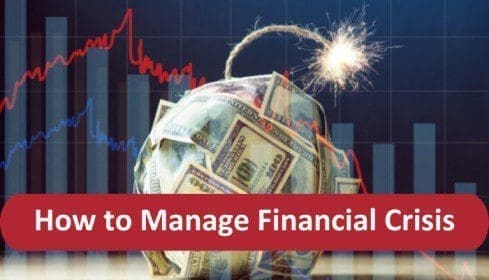Economic hardship and medical expenses can distort people’s attitudes and behaviours towards money, causing them to jeopardise their financial futures.

Rahkim Sabree has a residence in Hartford, Connecticut, as well as investments and savings. However, this is not always sufficient to make him feel secure. Regardless of the amount, he is troubled by unanticipated expenses.
Mr. Sabree, a 33-year-old financial counsellor and consultant, said, “When I have to spend money, I get very anxious.” This causes him to delay paying for necessities such as new shoes and home repairs.
Mr. Sabree, who is black, lived with his family in subsidised housing and purchased supplies with food stamps during his adolescent years. “When the situation became extremely dire, we were without electricity and water,” he explained. They were almost thrown out multiple times. Mr. Sabree recalled that seeing an eviction notice on the door was humiliating.
These experiences have influenced his spending and saving habits. Mr. Sabree said that feeling in control of his finances brings him serenity. When this control is lost, however, anxiety sets in. “I feel as though something is happening to me rather than me causing something to occur,” he said.
According to Alex Melkumian, founder of the Financial Psychology Centre in Los Angeles, experiences like Mr. Sabree’s can contribute to what financial psychologists refer to as “financial trauma” — an intense and long-lasting emotional response to current or prior financial distress.
Financial trauma can result in negative thoughts, flashbacks, and anxiety, which are symptoms of post-traumatic stress disorder (PTSD). Trauma, unlike ordinary tension, does not wax and wane. According to Thomas Faupl, a financial therapist in San Francisco, it ultimately harms your relationship with money.

Financial trauma is frequently caused by medical debt, financial insecurity, and an economic crisis. For instance, survivors of the Great Depression were less likely to invest in the stock market out of fear of another market collapse, which negatively impacted their retirement funds.
Inheriting your parents’ debt is one example of how trauma can be passed down through the generations. Dr. Melkumian added that systemic issues like racism and discrimination may also play a role.
Financial trauma, unlike PTSD, is not a mental health diagnosis; therefore, financial advisors and therapists frequently neglect it. Mr. Faupl stated that many individuals are never informed that traumatic financial experiences can be detrimental to their financial and psychological health. Despite this, a 2016 survey revealed that 25% of Americans, including 36% of millennials, reported financial stress-related PTSD symptoms.
Recognise stress signals
According to Dr. Melkumian, avoiding money is a symptom of financial trauma. In other words, traumatised individuals may refuse to create a budget, open their invoices, or discuss their financial situation.
Avoidance can also involve failing to spend when necessary. Mr. Sabree used to attribute his behaviour to his thriftiness. In contrast to saving for a rainy day, he realised that his decisions were sometimes motivated by a desire to avoid another encounter with destitution.
According to Aja Evans, a financial therapist in New York City, any traumatic event involving money can make you feel insecure. She explained that this frequently leads to negative beliefs, such as “I’ll never have enough money” or “I’ll never be good with money.”
Overspending can also indicate financial distress. You may attempt to mitigate for childhood deprivation by overindulging as an adult. For instance, you could spend all of your savings on a vacation, excessively dine out, or online purchasing.
In this manner, Chantel Chapman, a 40-year-old entrepreneur from Richmond, British Columbia, was formerly a spendthrift. She stated that she purchased gifts, attire, and dinners that she could not afford for nearly a decade. This left her with nearly $10,000 in credit card debt and another $10,000 in tax debt, which diminished her ability to save.

Ms. Chapman, like Mr. Sabree, grew up without financial stability. However, while Mr. Sabree’s financial trauma caused him to be parsimonious, Ms. Chapman’s caused her to overspend.
“I had a lopsided relationship with money,” she said. Ms. Chapman stated that she feared debt, but that her desire to fit in with a more affluent society caused her to overspend. Trauma made her a people-pleaser, she said, adding, “I thought I had to look a certain way to be accepted.”
The destruction of your financial prospects is another warning sign. Mr. Faupl stated that you may believe having a high-paying job is egotistical or something you don’t deserve. As a consequence, saboteurs may choose not to apply for higher-paying jobs or may never request a pay increase.
Once you are able to identify the indicators of financial distress, you can work towards a solution. Mr. Faupl suggested examining the issue through the lens of money as a starting point. From this vantage point, you should ask yourself, “What do I need to do to address my financial situation?”
Look out for catalysts
Any thought, emotion, or memory associated with a traumatic event can induce distress. For instance, if you lost money during the financial crisis of 2008, watching the stock market decline can induce anxiety. Or, if you have student loan debt, the end of the payment halt could be unsettling.
“It can feel like watching a scary movie all over again,” said Michelle Griffith, a senior wealth adviser with Citi Personal Wealth Management.
Some of Ms. Griffith’s consumers are experiencing a rise in financial distress, as observed by Ms. Some individuals lost up to 40 percent of their retirement savings in 2009. Now, with the prospect of another economic downturn, they fear a repeat. This can cause people to dread the inherent hazards of investing, according to Ms. Griffith, causing them to cash out their investments or retirement accounts prematurely.
When the emotional tide is high, Ms. Griffith advises basing decisions on the facts. “Even bear markets rebound,” she remarked. And over the previous seven decades, the stock market has declined by 5 percent multiple times per year. Ms. Griffith stated that realising that downturns are transient can help alleviate the pain associated with them.
Ms. Evans stated that while no one can predict the future, being able to recognise your triggers places you in a better position to take care of yourself. She stated that even taking a few long breaths, going for a walk, or conversing with a friend can be calming and reduce the likelihood of impulsive behaviour.
Establish fiscal constraints
Boundaries help us feel secure in our relationships, and they can also keep our financial conduct in check.
Ms. Evans suggests, for instance, that overspenders remove their credit cards from applications and online retailers. She stated that the surge of dopamine produced by a purchase can impair your self-control. But without a credit card, it is more difficult to indulge.
People who avoid money can take small risks, such as spending $10 or $20 on an enjoyable experience. Dr. Melkumian refers to this as “mandatory splurging” and says it’s one way to leave your comfort zone. He stated that it involves doing the inverse of what the negative emotion suggests.

Any behaviour that prevents avoidance is advantageous. Monthly automatic transfers from your checking account to your savings account were suggested by Ms. Griffith. Additionally, you can automate your monthly utility payments and allocate a portion of your paycheck to your retirement account.
Find assistance
Recovering from a financial catastrophe requires a two-pronged strategy. Mr. Faupl stated that you must address both the financial aspect and the trauma that caused it.
The first stage is to consult with a financial therapist who specialises in financial trauma. With a background in psychology and finance, the financial therapist can assist you in comprehending the connection between your traumatic experience and your financial problems. Mr. Faupl explained that if your family fought about money when you were a child, you may avoid challenging financial dialogues as an adult. Or, if you did not enjoy financial stability as a child, you may accumulate wealth as an adult.
In addition to counselling, attending a class on financial literacy or consulting with a financial adviser can help you achieve success.
Ms. Chapman sought psychotherapy and financial education for her recovery. None of her clinicians, however, made the connection between her trauma and her financial difficulties. She confessed that being told to employ resolve made her feel more ashamed. Ms. Chapman co-founded the Trauma of Money, an educational website that instructs seminars on financial trauma literacy, with the intention of educating others.
Mr. Sabree also endeavours to assist others, particularly members of the Black community, in developing healthier financial practises. Personal and professional experience have taught him that financial trauma never truly disappears.
“It’s not like turning off a light switch,” he explained. It cannot be eradicated, but it can be overcome.

